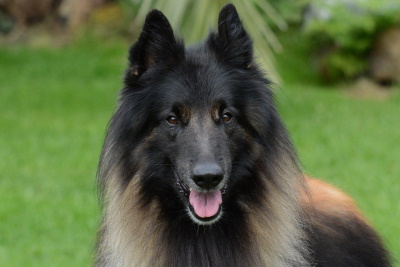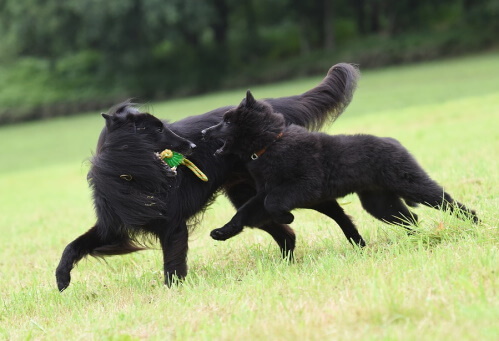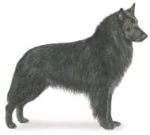Belgian Sheepdogs
The Black Sheepdog Of The Family!
Although known simply as Belgian Sheepdogs in the United States, this breed is well known in many parts of the world as the Belgian Groenendael, or Chien de Berger Belge. They were first recognized by the American Kennel Club in 1912 and classified with the herding dog group.

There are four different varieties of Belgian Shepherd dogs - the Belgian Groenendael, Laekenois, Tervuren and Malinois - all of these herding dogs are named for the towns from which they originated.
The main difference between them is in their coat color and coat type, the Groenendael bearing a full long coat of jet black color. Each of these varieties now have separate recognition by the AKC.
These Sheepdogs are impressive, displaying a proud carriage that is well defined and indicative of both strength and balance. The head is finely sculpted and compliments a squarely built athletic body.
Their heritage is distinguished by their working contributions to both World War I and II, where they were successful in carrying messages between the battlefields, providing ambulance assistance, and even pulling armaments when needed.
Many of these herding dog breeds were also assigned to guard duty at military bases.
Today, for the most part, Belgian Sheepdogs are no longer working as herding dogs. None the less, they enjoy a job to do and excel in tracking, competitive obedience, police work, search and rescue, assistance and therapy work.
Characteristics of Belgian Sheepdogs
Belgian Sheepdogs are intelligence, confident, loyal and very devoted to
their family. They thrive in a family that can give them a lot of
interaction and make them part of everything they do.
Consistent with most breeds of herding dogs, their nature is inherently
alert and protective. These traits make them vigilant watch and guard
dogs, though not aggressive.
The Belgian is gentle, affectionate and friendly, seeks attention and is eager to please his master. He does best
with owners who are experienced, capable of providing strong leadership and training, but without
harshness.
Early socialization to people, a variety of venues and situations, is strongly advised.
 Image by Blaer at Pixabay
Image by Blaer at PixabayPhysical Stats And Care
Height: 22-26 inches
Weight: 61-66 pounds
Color Variations: Black, or may have patches of white on
the chest, on chin and muzzle, on tips of rear toes and between pads of feet.

The medium textured coat is straight, abundant and long, being especially thick around the
neck like a collar. The coat also forms a fringe on the back of the forelegs as well as the
hindquarters.
Maintenance involves daily
brushing to remove loose hair and prevent mats from forming. Heavy seasonal shedding occurs a couple of times a year.
Health Notes
For a large dog, the Belgian Sheepdog has a relatively long life span of 12 to 14 years. While considered to be generally robust, there are some health issues associated with the breed to be aware of. These include:
- Hip and Elbow Dysplasia: A malformation of the dog's joints that generally occurs with age and in some cases may need surgical intervention.
- PRA or Progressive Retinal Atrophy: A condition that affects the retina and generally leads to blindness.
- Cataracts: Appearing as cloudy spots on the eyes than can progress and lead to deterioration of vision. Surgery is an option for removal in some cases.
- Epilepsy: Causes mild to moderate seizures in dogs.
The Belgian Sheepdog Club of America recommends the following bodily areas that should be tested in the breed throughout the dog's lifetime and particularly by professional breeders:
Hips, Elbows, Eyes, Thyroids, Patellas, and Cardiac evaluation.
These test results should be made available to prospective buyers of puppies:
Detailed health information is available at the Club website here.
How Active is the Breed?
Herding dog breeds, originally developed as working dogs, need a considerable amount of exercise to satisfy their high energy and active heritage.
Potential owners should be prepared to provide a couple of vigorous walks on a daily
basis, along with frequent opportunities for other energetic
activities, as the ideal.
In addition, running off leash in a safe open area whenever possible, will be greatly enjoyed.
Remember not to isolate this family oriented dog in the back yard to entertain himself. Go out there with him and play some fun games of fetch instead.
A dog treadmill can be a useful adjunct on days when other forms of exercise are not available.
Ideal Living Space
Does best in home with a good-sized, fenced, outdoor area that can be used for training, playing and the other normal dog needs.
While he enjoys being be outside for short periods of time - preferably with you, he mostly wants to be inside or wherever
the family is.
Don't leave him alone for long periods of time if you can avoid it as this would set him up for feelings of anxiety and unwanted behaviors.
Belgian Sheepdogs With Children?
While the Belgian is considered both pet and child-friendly, my recommendation, if you have young children, is to get one as a puppy and raise them together. A parent should take into consideration that this breed
is quite large and might be overwhelming for toddlers.
As with any breed of dog, interactions between pets and children should always be monitored by a parent or other adult.
Seniors Or Less Active Families?
Belgian Sheepdogs are not recommended for senior owners or sedentary environments due to high exercise needs.
But don't rule out this protective and loyal breed if you can arrange for his needs to be met with outside help.
Before You Go...
If you like the content of this page, as well as others on my site, please give it some love by clicking on the heart in the lower right hand corner. This helps me to keep providing enjoyable and useful content.
Thank you.
Recommended Book

Covers the history of the breed, how to locate a puppy, characteristics of the BSD, all aspects of care including feeding, training, grooming, health care and more. Written by an authority of the breed as well as a renowned judge.



